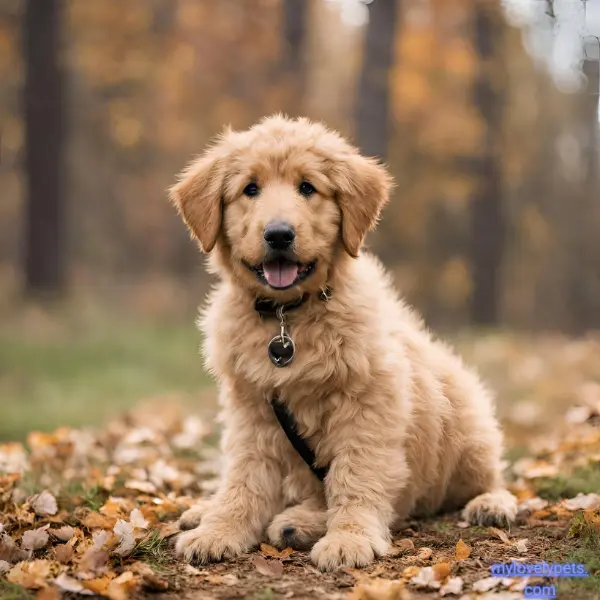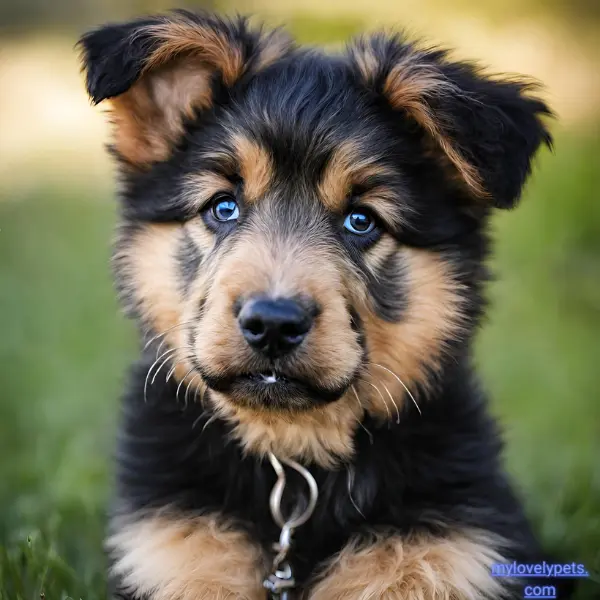
Goldendoodle German Shepherd Mix: Guide to the German Doodle
The Goldendoodle German Shepherd mix, often referred to as the German Doodle, is a fascinating combination of three distinct breeds: the German Shepherd, the Golden Retriever, and the Poodle. In this comprehensive guide, we’ll delve into various aspects of this hybrid breed, covering their physical characteristics, temperaments, training, health considerations, and more. By the end of this article, you’ll have a thorough understanding of what it takes to care for and appreciate the unique qualities of the Goldendoodle German Shepherd mix.
Understanding the Genetic of Goldendoodle German Shepherd Mix
The German Doodle is a hybrid that results from breeding a German Shepherd with a Goldendoodle, which is a cross between a Golden Retriever and a Poodle. Specifically, the German Doodle is half German Shepherd, one-quarter Poodle, and one-quarter Golden Retriever. These dogs are known for their intelligence, affectionate nature, and medium to large size, often weighing up to 65 pounds when fully grown. The size can vary, influenced in part by the size of the Poodle grandparent, as Poodles come in toy, miniature, and standard sizes.
Three Breeds, Three Origins
Each of the three contributing breeds—the Poodle, the Golden Retriever, and the German Shepherd—brings its unique set of characteristics to the mix. While many people are familiar with the herding instincts of German Shepherds and the retrieving history of Golden Retrievers, the Poodle also has a retrieving background. This shared heritage contributes to the German Doodle’s high degree of trainability, making them responsive and cooperative companions.
Physical Characteristics of German Doodle Dogs
When it comes to the physical characteristics and appearance of the German Doodle, it’s essential to recognize the influence of its three parent breeds: the German Shepherd, the Golden Retriever, and the Poodle. This unique mix results in a dog that showcases a variety of traits, making each German Doodle distinctive in its own right.
Coat and Color Variations

The coat of a German Doodle is one of its most distinguishing features. Typically, it is medium-length with a slight wave, often resembling the luxurious coat of the Golden Retriever more than the straight fur of the German Shepherd. The Poodle influence may contribute to a looser curl, offering a delightful blend of textures. Common coat colors include shades of gold, cream, and apricot, with darker patches on the back and head.
Facial Features and Structure
German Doodles often inherit a combination of facial features from their parent breeds. While the domed forehead and expressive eyes may reflect the German Shepherd’s influence, the snout and jaw structure may lean towards the Golden Retriever side. Ears can be a mix of both breeds, sometimes tipping over like a Golden Retriever or standing erect like a German Shepherd. The result is a harmonious blend that contributes to the German Doodle’s unique and endearing appearance.
Size and Build
German Doodles typically fall into the medium to large size category, thanks to the substantial build of both the German Shepherd and the Golden Retriever. The Poodle influence may contribute to variations in size based on whether the Poodle parent was a toy, miniature, or standard size. As such, German Doodles can range in height from 20 to 25 inches and weigh anywhere between 50 to 65 pounds. The overall build is well-muscled and athletic, showcasing a balance between the elegance of the Golden Retriever and the strength of the German Shepherd.
Tail and Posture
The tail of a German Doodle can vary, often taking after the bushy and expressive tail of the Golden Retriever. However, some may inherit the straight and more reserved tail carriage of the German Shepherd. Their posture is generally well-balanced, reflecting a blend of both parent breeds’ characteristic stances. The German Doodle stands proud and alert, showcasing the confidence and poise instilled by its lineage.
Size, Weight, and Lifespan
When fully grown, the German Shepherd Goldendoodle mix typically measures between 17 to 26 inches in height and weighs 15 to 90 pounds. The size can be influenced by factors such as genetics, activity level, health, and nutrition. The lifespan of these dogs ranges from 9 to 15 years, with proper care.
Temperament & Personality of Goldendoodle German Shepherd mix
The temperament of the German Doodle, a mix of German Shepherd, Golden Retriever, and Poodle, is a captivating blend of qualities from each contributing breed. Understanding and appreciating their unique temperament is crucial for effective training and creating a harmonious relationship. Here’s an in-depth exploration of the key temperament traits you can expect in a German Doodle:
- Intelligence: The German Doodle is renowned for its high intelligence, drawing from the smart and trainable characteristics of both the Poodle and the German Shepherd. This intelligence makes them quick learners, adaptable to various tasks and commands. However, it’s important to note that their intelligence can also lead to a degree of independence, so consistent and positive reinforcement-based training is essential.
- Loyalty: Loyalty is a trait commonly associated with German Shepherds, and the German Doodle inherits this quality as well. These dogs form strong bonds with their human family members and are often protective, making them excellent companions for those seeking a loyal and devoted pet. Early socialization is key to ensuring they are well-adjusted and exhibit positive behavior around strangers and other animals.
- Socialization: Socialization is a critical aspect of a German Doodle’s development. While Golden Retrievers tend to be naturally friendly, the reserved nature of Poodles and the protective instincts of German Shepherds can influence the socialization process. Exposing them to various environments, people, and other animals from a young age helps prevent shyness or aggression as they mature.
- Playfulness and Energy: Both Golden Retrievers and Poodles are known for their playful and energetic nature, and this trait is evident in the German Doodle as well. Regular playtime and exercise are essential to prevent boredom and excess energy, which could lead to undesirable behaviors. Structured activities, interactive toys, and daily walks contribute to a happy and well-balanced German Doodle.
- Adaptability: The adaptability of the German Doodle is a result of the versatility of its parent breeds. Whether living in an apartment or a spacious home with a yard, they can adapt to various living conditions. However, their need for mental stimulation and physical exercise means that they thrive best in environments where they receive ample attention and engagement from their human companions.
Grooming Needs of Goldendoodle German Shepherd mix

Grooming is a vital aspect of caring for a German Doodle, and the specific grooming requirements can vary based on the coat type inherited from its Poodle and Golden Retriever parents. Here’s an in-depth look at grooming considerations for the German Doodle:
- Coat Types: German Shepherd Goldendoodle mix can have coats that are straight, wavy, or curly, influenced by the genetics of the Poodle parent. Regardless of the coat type, regular brushing is essential to prevent matting and tangling. Brushing frequency may vary from a few times a week to daily, depending on the density and length of the coat.
- Bathing and Hygiene: Bathing should be done as needed, typically every 4-6 weeks, to keep the coat clean and healthy. Use a dog-friendly shampoo to avoid skin irritation. Additionally, regular ear cleaning, nail trimming, and dental care contribute to overall hygiene.
- Shedding and Allergies: While some believe that Poodle mixes are hypoallergenic, it’s important to note that there is no guarantee that German Doodles are hypoallergenic. Both Golden Retrievers and German Shepherds shed, and the coat of a German Doodle may not trap allergens as effectively as a tightly curled Poodle coat. Regular grooming helps manage shedding and reduces the likelihood of allergic reactions.
- Professional Grooming: Many German Doodle owners opt for professional grooming services, especially for more complex grooming tasks such as trimming around the ears and paws. Professional groomers can also provide guidance on the specific needs of your dog’s coat and recommend suitable grooming tools.
- Seasonal Changes: Some German Doodles may experience seasonal shedding, particularly during the change of seasons. Increased shedding during these times is normal, and more frequent brushing can help manage loose hair.
Health Issues of Goldendoodle German Shepherd Mix
Ensuring the well-being of the German Shepherd Goldendoodle mix involves awareness of potential health issues.
- Hip Dysplasia: This common orthopedic issue affects the hip joints, potentially leading to pain and decreased mobility. While it is prevalent in both German Shepherds and Golden Retrievers, regular exercise, a balanced diet, and maintaining a healthy weight can help manage this condition.
- Degenerative Myelopathy: A progressive disease affecting the spinal cord, degenerative myelopathy can lead to hind limb weakness and paralysis. While there is no cure, early detection and supportive care can help manage symptoms and maintain a good quality of life.
- Von Willebrand Disease: This inherited bleeding disorder affects the blood’s ability to clot properly. Regular veterinary check-ups, a balanced diet rich in essential nutrients, and avoiding unnecessary medical procedures can help manage this condition.
- Progressive Retinal Atrophy (PRA): PRA is a group of genetic diseases that cause the gradual degeneration of the retina, leading to vision impairment and eventual blindness. Regular eye check-ups and a diet rich in antioxidants may help support eye health.
- Allergies: German Shepherd Goldendoodle mixes may be prone to skin allergies. Regular grooming, including bathing and brushing, can help minimize skin issues, while a balanced diet with omega-3 fatty acids may support skin health.
- Ear Infections: Due to the floppy ears inherited from the Golden Retriever parent, these dogs may be more prone to ear infections. Regular ear cleaning and inspection can help prevent infections, and a veterinarian can provide guidance on proper ear care.
- Regular Vet Check-ups: Schedule routine veterinary visits to monitor your dog’s overall health, address concerns promptly, and stay up-to-date on vaccinations and preventive medications for issues such as fleas, ticks, and heartworm.
Training the Intelligent German Doodle

Training a German Doodle is a rewarding experience due to their high intelligence and eagerness to please. Here’s an in-depth exploration of effective training methods for these intelligent and trainable dogs:
- Start Early and Be Consistent: Early training is crucial for shaping a well-behaved German Doodle. Begin with basic commands such as sit, stay, and come. Consistency is key; use the same commands and reward system throughout the training process. Positive reinforcement, such as treats and praise, works exceptionally well with this breed.
- Socialization Training: Socialization should start during puppyhood and continue throughout their lives. Expose them to various people, environments, sounds, and other animals to ensure they grow up to be confident, well-mannered dogs. Positive experiences during socialization contribute to a more balanced temperament.
- Obedience Training: German Doodles thrive on obedience training, and it’s essential to establish yourself as the pack leader. Incorporate commands that enhance their self-control and responsiveness. Teaching them to walk on a leash without pulling, wait at doors, and greet people politely can contribute to a well-behaved companion.
- Interactive Play and Mental Stimulation: In addition to physical exercise, German Doodles benefit from mental stimulation. Interactive play, puzzle toys, and obedience games keep their minds engaged and prevent boredom. This is especially important, as their intelligence can lead to restlessness if not adequately stimulated.
- Positive Reinforcement: Positive reinforcement, such as treats, praise, and affection, is highly effective in motivating a German Doodle during training sessions. Rewarding good behavior reinforces the desired actions and strengthens the bond between you and your dog.
- Avoid Harsh Punishments: German Doodles respond poorly to harsh training methods or punishment. This can lead to fear and anxiety, negatively impacting their behavior and the training process. Focus on positive reinforcement to build a trusting and cooperative relationship.
- Professional Training Classes: Enrolling in professional training classes, especially for first-time dog owners, can provide guidance and structure. Trainers with experience in positive reinforcement techniques can offer valuable insights and help address specific training challenges.
- Patience and Persistence: Patience is a virtue when training any dog, and German Doodles are no exception. Be patient, consistent, and understanding. If faced with challenges, consult with a professional trainer for advice tailored to your specific situation.
Food and Diet for the German Shepherd Goldendoodle Mix
Proper nutrition is fundamental to the health and well-being of your German Shepherd Goldendoodle mix. A well-balanced diet supports their growth, energy levels, and overall vitality. Consider the following factors when planning their food and diet:
- High-Quality Dog Food: Choose a high-quality commercial dog food that is appropriate for your dog’s age, size, and activity level. Look for options that list meat as the primary ingredient and avoid fillers like corn and soy.
- Protein Requirements: Given their size and energy levels, German Shepherd Goldendoodle mixes benefit from a diet rich in protein. Protein supports muscle development and overall health. Look for a dog food with a protein content of around 18-22%.
- Healthy Fats: Include sources of healthy fats in their diet, such as omega-3 and omega-6 fatty acids. These fats support coat health, skin condition, and overall immune function.
- Avoid Overfeeding: German Shepherd Goldendoodle mixes can be prone to weight gain, which can contribute to joint issues. Measure their food portions and avoid overfeeding, taking into account their age, weight, and activity level.
- Regular Feeding Schedule: Establish a regular feeding schedule, providing meals at consistent times each day. This routine helps regulate their metabolism and can assist with housetraining.
- Fresh Water: Ensure your dog has access to fresh, clean water at all times. Hydration is crucial for overall health, especially for active and energetic breeds like the German Shepherd Goldendoodle mix.
- Consultation with a Vet: Consult with your veterinarian to determine the specific nutritional needs of your individual dog. They can provide guidance on portion sizes, dietary supplements, and any dietary restrictions based on your dog’s health.
- Treats in Moderation: While treats can be a useful tool in training, offer them in moderation to prevent overindulgence and weight gain. Opt for healthy, low-calorie treats or use small pieces of their regular food.
Finding a German Shepherd Goldendoodle Mix Puppy
Locating a reputable source for a German Shepherd Goldendoodle mix puppy is essential for a positive ownership experience. Consider the following options:
- BFF Puppies: Serving from Pennsylvania and Ohio, BFF Puppies connects prospective owners with responsibly bred German Shepherd Goldendoodle mix puppies.
- Greenfield Puppies: Based in Pennsylvania, Greenfield Puppies offers a platform to find puppies, including the German Shepherd Goldendoodle mix, from screened and reputable breeders.
- Adoption and Rescue Organizations: Consider adopting from local shelters, rescue organizations, or breed-specific rescues. This humane option provides loving homes for dogs in need.
Goldendoodle German Shepherd Mix: Pros and Cons
As with any breed, the Goldendoodle German Shepherd mix comes with its set of pros and cons. Consider these factors as you contemplate making this delightful hybrid a part of your family:
Pros:
- Loyal Companionship: Known for their loyalty, these dogs forge strong bonds with their families, providing unwavering companionship.
- Adaptable Nature: Their adaptability to diverse living conditions, whether urban apartments or spacious rural homes, makes them suitable for a wide range of households.
- Intelligence and Trainability: A blend of the intelligent German Shepherd and trainable Golden Retriever and Poodle genes results in a dog that is quick to learn and eager to please.
- Hypoallergenic Coat: The hypoallergenic coat makes them suitable for families with allergies, adding an extra layer of appeal.
Cons:
- Potential Aggression: While generally friendly, some individuals may display signs of aggression as they mature. Early socialization and training are crucial to mitigate this risk.
- Exercise Needs: High energy levels require regular exercise, and insufficient physical activity may lead to behavioral issues.
- Grooming Commitment: Their distinctive coat demands regular grooming to prevent matting and maintain overall health.
- Finding Reputable Breeders: Due to their popularity, finding reputable breeders can be challenging, and caution is advised against online purchases to avoid scams.
FAQs:
Are Goldendoodle German Shepherd Mixes good with children?
Yes, these mixes are generally good with children, especially when socialized from a young age. However, as with any dog breed, supervision is recommended to ensure a harmonious interaction between the dog and children.
Do they shed a lot?
The shedding level varies among individuals, but their Poodle ancestry often results in less shedding. Regular grooming is essential to prevent matting and maintain a healthy coat.
What is the lifespan of a Goldendoodle German Shepherd mix?
On average, these hybrids have a lifespan of 10 to 15 years, provided they receive proper care, nutrition, and regular veterinary check-ups.
Are they good guard dogs?
Yes, their German Shepherd lineage contributes to a natural guarding instinct. While they may not be as protective as purebred German Shepherds, they can still exhibit protective behavior.
How much exercise do they need?
These dogs are moderately active and require regular exercise to expend their energy. Daily walks, playtime, and mental stimulation are essential to keep them happy and healthy.
Are Goldendoodle German Shepherd mixes hypoallergenic?
While not guaranteed, their Poodle ancestry often results in a hypoallergenic coat, making them suitable for individuals with allergies. However, it’s recommended to spend time with the dog before bringing one home to ensure compatibility.
Final Thought: The German Doodle as an Ideal Companion
In conclusion, the German Doodle, a mix of German Shepherd, Golden Retriever, and Poodle, offers a delightful combination of intelligence, loyalty, and affection. Whether you’re seeking a family companion, a service dog, or an active playmate, the German Doodle’s versatile nature makes it a suitable choice for various lifestyles. Remember that responsible ownership involves meeting their physical and mental needs, prioritizing health care, and fostering a strong bond through positive training and socialization. With the right care and attention, your German Doodle can become a cherished member of your family, bringing joy and companionship for years to come.


